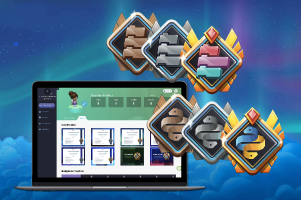Tynker Expands Computer Science Curriculum in the UK to Include 16 New Courses in JavaScript, Python, STEM Integration, and Drone Programming
New Curriculum Now Available for Primary and Secondary Science, Mathematics, and Computer Science Teachers Across Europe
LONDON, ENGLAND (PRWEB UK) 24 JANUARY 2017
Tynker, the leader in creative computing that has introduced more than 45 million kids to computer programming through innovative game-like learning activities and courses, today announced a new curriculum for schools across the UK and Europe. Tynker will demonstrate the new courses at the BETT Show, taking place January 25-28 in London, England.
The new curriculum for the 2017-2018 school year adds JavaScript and Python courses, 12 STEM programming courses, and a course on drone programming in partnership with Parrot, one of the world’s leading civil drone companies. To date, nearly 2,000 schools in the U.K. use Tynker to teach coding.
“More than 45 million kids have been introduced to computer programming through our online courses, apps, and in-class teaching platform. We’ve had significant demand to expand into STEM subjects and makerspace arenas, so it’s incredibly rewarding to be able to offer these exciting new courses,” said Krishna Vedati, co-founder and CEO of Tynker. “We hope that our new upper level courses in JavaScript, Python, STEM, and drones will inspire an even greater number of students to embrace coding as a way to enhance their learning and careers.”
Even though coding has become a part of the national curriculum in the UK, research conducted by Ocado showed that 130,000 English primary school teachers did not feel confident enough to teach their pupils how to code, and out of 250 teachers, 73% said they did not feel they had been given the necessary resources. In response, Tynker has launched new programming courses, which make it easy for students to learn on their own with self-guided, self-paced lessons. With comprehensive teacher resources, lesson plans, and guides, Tynker’s courses allow teachers with no programming experience to teach coding and incorporate programming into what they’re already teaching.
“Tynker has everything. At one level, it allows the teacher to use example lessons to cater for all abilities. On another, it enables the teacher to create their own on-line lessons, which the children can follow through,” said Randall Brook, Head Teacher of Mawnan C of E VA School, based in Falmouth, Cornwall, UK. “Most importantly, the children love exploring and learning for themselves. Underlying all this, Tynker assesses the children's understanding of many concepts, allowing the teacher to view and print out a record of concept understanding for the class as a whole or individual pupils.”
Tynker’s fun, game-based curriculum teaches students coding and computational thinking as they creatively code games, animations, stories, and school projects. Courses are grade-specific and scaffolded to ensure a progression of skills each year. Every lesson has a detailed teacher guide, collaborative ideas, mapping to relevant standards, sample working programs, interactive tutorials, and applications to real-world issues.
Tynker’s STEM and Project-Based Learning modules challenge students with over 200 real-world problems in all subjects, including Mathematics, Earth Science, Life Science, Physical Science, Social Studies, and Language Arts. The lesson modules provide a framework for them to collaborate, experiment, apply concepts and skills they have learned, and share their results with the class.
12 STEM courses are included for 8 - 13 year old activities that are aligned with standards. Examples of STEM activities include:
● Simulate the greenhouse effect and show how it causes climate change
● Program a game where the player sorts words based on their part of speech
● Experiment with a coin toss to understand randomness and probability
● Diagram ancient trading routes or migration patterns
● Code a game where you match equivalent fractions
Tynker’s drone curriculum offers a structured approach to get primary and secondary school students flying drones in minutes. Students practice their drone flying skills in a virtual environment before they are ready to execute the commands on a real drone.
“Who doesn’t want to program and control their own drone?” says Jerome Bouvard, Education Program Director, Parrot. “We are really excited to collaborate with Tynker, the leader in teaching kids to code, and create a learning platform that will inspire students of all ages to innovate and build the next generation of useful applications with drones, not yet imagined!”
Tynker’s JavaScript and Python courses are designed to bridge young learners from visual block-based programming to mainstream text-based coding with syntax and structure. Each of these courses is an immersive adventure where students solve coding puzzles, complete debugging quests, and build projects as they apply their coding skills.
To preview Tynker’s new programming courses and Parrot Education’s offerings at BETT, please visit Stand F447.
About Tynker
Tynker’s award-winning creative computing platform helps children develop computational thinking and programming skills in a fun, intuitive, and imaginative way. Tynker is used by more than 60,000 schools and 45 million students, spanning over 150 countries. Tynker was founded by a seasoned team of technology entrepreneurs who share a passion for giving children the critical life skills needed to become leaders in the technologies of tomorrow. For more information, please visit http://www.tynker.com, like us on Facebook, and follow us on Twitter @GoTynker.
Media Contact
Press Relations
press@tynker.com
(650) 308-8386
